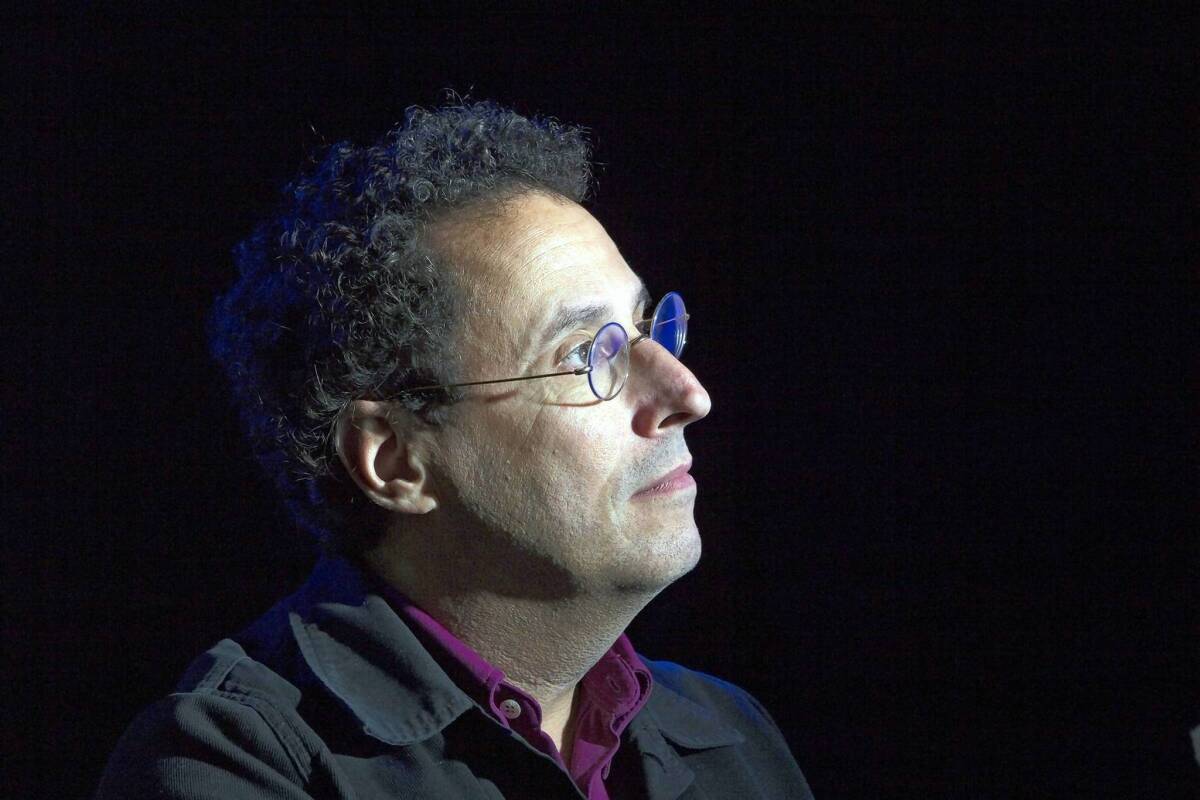‘Lincoln’ writer Tony Kushner on working with Steven Spielberg

- Share via
Tony Kushner had a decade’s worth of plays behind him when his epic two-part masterpiece, “Angels in America,” exploded in the mainstream in 1992, going on to win the Pulitzer Prize, two best play Tonys and a clutch of other stage awards. In adapting the play with Mike Nichols for cable TV, he discovered a fresh way to tell stories; “Angels” eventually won 11 Emmys for HBO in 2004. Since then, the playwright has added screenwriting to his credits with 2005’s “Munich” and this year’s “Lincoln” (both for director Steven Spielberg). It’s a change that clearly works for him: “Munich” earned him an Oscar nomination and “Lincoln” is certain to garner further awards attention for the writer who is still getting used to the finality of working in film.
Kushner spoke to The Envelope about the “Angels” legacy, working with Steven Spielberg and why one can’t afford to be just a playwright in America.
“Lincoln” is only your second feature film screenplay. Why not do more?
AWARDS: OSCARS 2013
Making movies is a very different experience in a lot of ways. It’s difficult when you’re used to owning the copyright and having a landlord’s possessory rights — I rent my plays to the companies that do them and, if I’m upset, I can pull the play. But the only two directors I’ve worked with are pretty great. It’s a real rarefied atmosphere; I’ve been treated with respect and as a creative partner.
What have you learned about transferring your written words to a different medium?
I think the hardest thing is this vertiginous feeling that you work on a scene for a week, two weeks, months to get it right, and then on the day of filming you shoot that scene and it’s done, that’s it. When you write a play, it opens up and you have a sense of it, and it’s done over and over again. There’s nothing final about it. With film, you feel you’re feeding in these sheets, and it’s sucking them in and you’ll never see them again.
“Munich” was eye-opening for a lot of reasons, one of which is that there aren’t a lot of films in which Jews kick butt. Why is that?
It is great to see some bad-ass Jews kicking butt, but I have a lot of mixed feelings. There have been many instances of incredible courage and bravery among Jews, but Judaism places a great deal of importance on the relationship of the individual to God, and to one’s own conscience. The act of thinking and interpreting is so central to Judaism that it makes more sense that we’ve become people like Woody Allen — thinkers and talkers and drafters of law. But Eric Bana is mega hot, and there was Daniel Craig and, of course, when you get kicked around a lot, and your people have been murdered and sent to camps, there’s a desire for revenge and payback. There is something liberatory about standing up and refusing to take ....
BUZZMETER: Who’s ahead in the Oscar race
With “Lincoln,” how did you and Spielberg decide what story you wanted to tell?
I didn’t want to write a biopic. You want a drama to center around a small number of conflicts and work through those. So I decided to find a narrow window of time, and Steven liked that. It was intriguing to me that the fight to pass the 13th Amendment was not a big part of the Lincoln mythology, because he felt there was nothing he had done that was more important.
Tom Stoppard (“Anna Karenina”) and Richard Nelson (“Hyde Park on Hudson”) are two playwrights who also have films in early Oscar contention. Are you amused to be in their company in this medium too?
It is interesting, but it’s less of a rare thing than it once was. I’m happy that I feel a little less out of place in filmmaking than I once was — but it’s almost impossible for a playwright in the U.S. to make a living. You can have a play, like I did with “Angels,” and it still generates income for me, but it’s not enough for me to live on and have health insurance. So it’s partially a business thing. And I also wanted to challenge myself and see if I could do it.
So you might not write screenplays if you were more financially solvent?
I’m sure I would. There are some ideas that are occurring to me now that are probably better suited to film or to television than the theater — we’ve been talking about doing a series with HBO. So much television is operating on an incredibly high level of sophistication and integrity.
You’ve written dozens of plays. Does it ever bother you that most people still think, “He’s the ‘Angels in America’ guy”?
No — and yes. I mean, listen: I’m fairly certain when I die that the obituary will say, “Author of ‘Angels in America’ dies.” Unless I’m completely forgotten, and then it won’t say anything at all. I appreciate that “Angels” is durable, and 20 years later it means a lot to me. Still, when people come up and say, “I love your work, ‘Angels’!” I feel a little like, “But what about ‘Caroline or Change’? or ‘Munich’?” But that should be my worst problem.
MORE COVERAGE
PHOTOS: Memorable red carpet moments
VIDEO: Highlights from the Envelope Screening Series
THE ENVELOPE: Awards insider
More to Read
Sign up for The Envelope
Get exclusive awards season news, in-depth interviews and columnist Glenn Whipp’s must-read analysis straight to your inbox.
You may occasionally receive promotional content from the Los Angeles Times.






